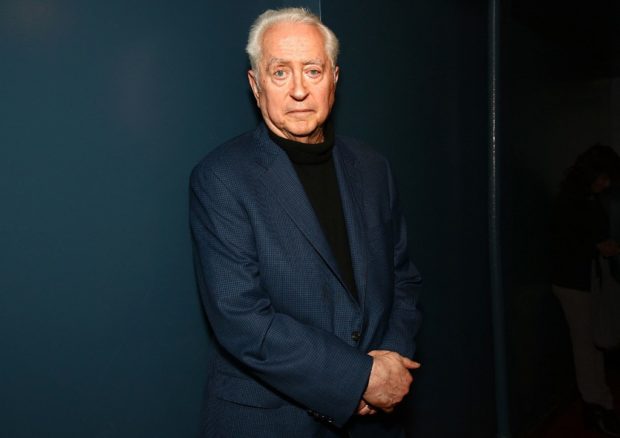Robert Downey Sr., director and father of Robert Downey Jr., dies at 85

Filmmaker Robert Downey Sr. Image: Getty Images/Astrid Stawiarz via AFP
Robert Downey Sr., director of the countercultural satire “Putney Swope” and the father of actor Robert Downey Jr., died Wednesday, July 7, in New York. He was 85.
Downey Sr.’s wife told the New York Daily News he had been suffering from Parkinson’s Disease.
Downey Sr. also acted, and directed several other films that gained a cult following. But 1969’s “Putney Swope” was given a mainstream release and thus exposed his work to a wider audience, which was shocked (even appalled) by much of what they saw at the time.
The devastating satire of Madison Avenue follows what happens when an African American activist is given a free hand at an ad agency. “Putney Swope” made New York Magazine’s list of 10 top films of the year.
Downey Sr. also acted, in films including “Boogie Nights” (1997), “Magnolia” (1999) and “The Family Man” (2000).
The cult director thrived in the auteur-driven 1970s film industry with irreverent works such as “Pound,” in which humans played dogs awaiting adoption. “Greaser’s Palace” (1972) was an outrageous restaging of the life of Christ in the context of a spaghetti Western, and Time put the film on its list of the year’s top 10 movies.
In the early ’70s he worked on projects for Joseph Papp and the New York Public Theatre, and directed David Rabe’s play “Sticks and Bones” in a live broadcast for CBS in 1973. The sponsors reacted to the play’s strong anti-war sentiments by pulling out at the last minute, forcing the network to air the play without interruptions.
Downey’s take-no-prisoners sense of humor is also apparent in 1975’s “Moment to Moment” (aka “Jive,” “Compliments to the World” and “Two Tons of Turquoise to Taos Tonight”), which also evinced Downey’s uncompromising sense of humor.
The director told the Village Voice that “it was hard to raise money for a film that didn’t really have a plot. I remember telling a guy once, ‘There’s a scene where we’re going to have 18 guys playing baseball on horseback,’ which is in there. He looked at me like: ‘Are you out of your f-king mind?’ Nicholson put money in, and Hal Ashby and Norman Lear, these pals of mine from back then. It’s my kids’ favorite film out of all of them.”
Actor Ron Leibman sued to have his name removed from the credits of Downey’s 1980 film “Up the Academy,” an attempt to replicate the success of “Animal House” but with antics much milder than the ones in the John Belushi film. His later films included the 1986 “America” and 1988 comedy “Rented Lips,” written by and starring Martin Mull.
“Too Much Sun” (1990) attracted more attention thanks to a cast that included Robert Downey Jr., Allan Arbus, Eric Idle and Ralph Macchio, earning the film a review in the New York Times: “Four bizarre-looking people are bidding emotional farewells to their overgroomed dogs, all poodles, which are going off on vacation in a van marked Poodle-Do. Thus begins Robert Downey’s amiable ‘Too Much Sun,’ a comedy of loosely strung together farcical situations that, played at half speed, elicit more good will than sustained laughter.
Downey Sr. made “Hugo Pool” after his second wife Laura died of ALS in 1994. The film, which world premiered at the Sundance Film Festival in 1997, promotes awareness of ALS. His documentary “Rittenhouse Square,” about Philadelphia’s main cultural and social center, was released in 2005.
Robert John Elias Jr. was born in New York City, the son of model Elizabeth (McLoughlin) and Robert Elias, who worked in hotel and restaurant management. He took the surname of his stepfather, James Downey, when enlisting in the Army.
His first several films were micro-budgeted, absurdist efforts that drew an underground following: “Balls Bluff” (1961), “Babo 73” (1964), “Chafed Elbows” (1966) and “No More Excuses” (1968).
Termed “anarchically whimsical and countercultural with a capital C” by the Village Voice, these early underground comedies were restored by Martin Scorsese’s Film Foundation, and in 2008, New York’s Anthology Film Archives screened all three, along with the newly recovered “Moment to Moment” (1975).
The Village Voice described “No More Excuses” (1968), as “the most uproarious of the bunch,” and declared that the film, in which Downey crashed “Yankee Stadium and a crowded subway car in a Union Army uniform, predate Borat’s public mischief by almost 40 years.”
Robert Downey Sr. was thrice married, the first time to the former Elsie Ann Ford from 1962-82, the second time to Laura Ernst from 1991 to 1994. The first of these marriages ended in divorce, the second in Ernst’s death.
He is survived by his third wife, author Rosemary Rogers, whom he married in 1998, and his two children by Ford, actor Robert Downey Jr. and Allyson Downey.
RELATED STORIES:
Tributes pour in for Bollywood veteran Dilip Kumar
Samuel E. Wright, Sebastian’s voice in ‘The Little Mermaid,’ dies at 74